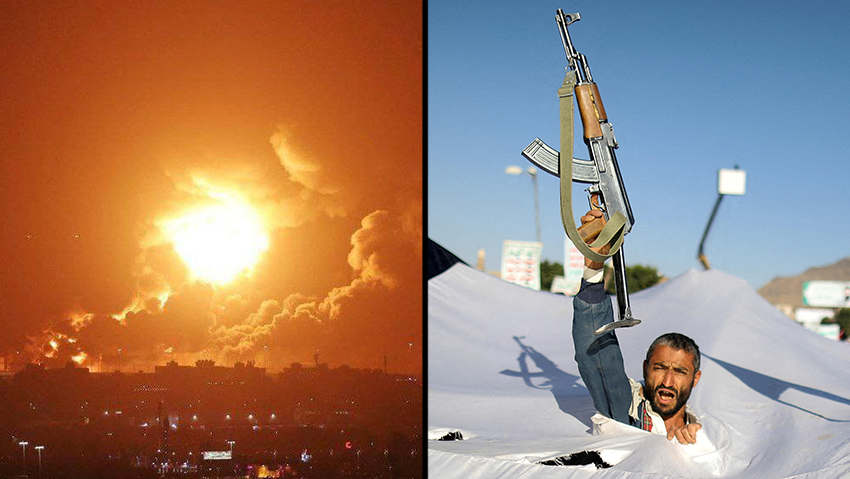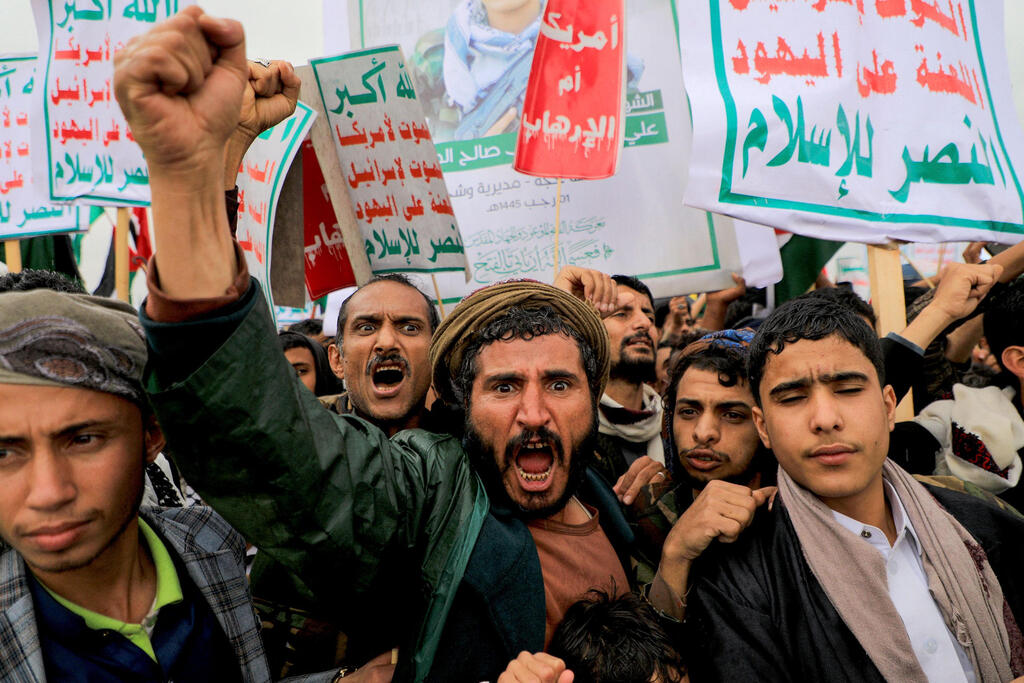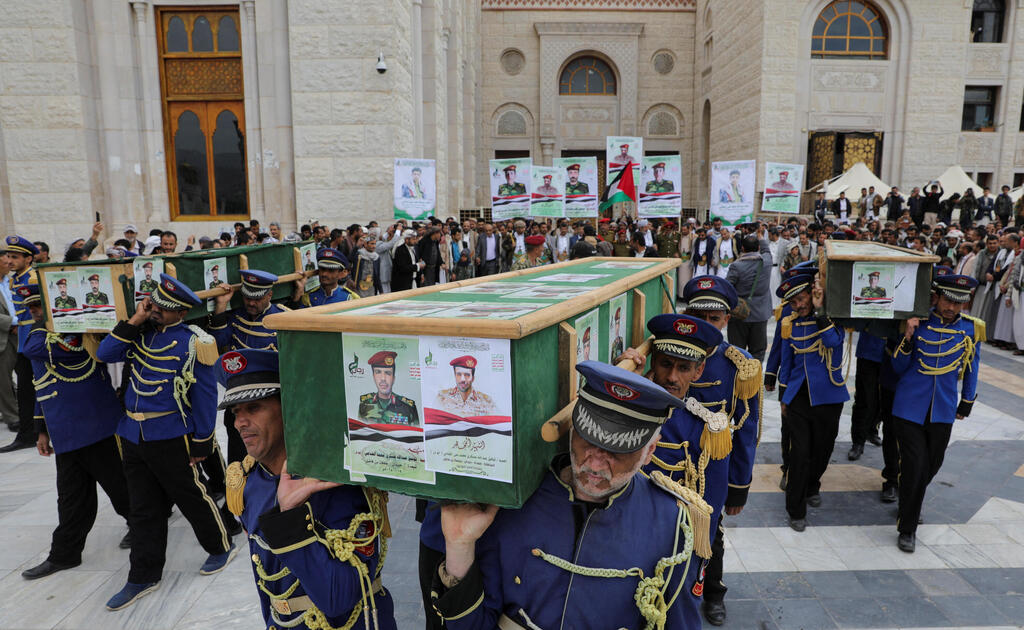Getting your Trinity Audio player ready...
The Arabic-language Sky News network reports a significant development regarding the recent attacks on the Houthis in Yemen. Led by the U.S., with initial participation from Britain, these assaults resulted in a loss of over 75 lives. Insider sources who spoke to the network revealed that among the casualties were "experts" affiliated with Iran's Revolutionary Guards and Hezbollah, and only Saturday did the covert mission of these individuals to support Houthi attacks on ships in the Red Sea and the Gulf of Aden came to light.
Read more:
According to a report from Sky News in Arabic, the recent attacks in Yemen resulted in the deaths of three members of Iran's Islamic Revolutionary Guards Corp, six members of Hezbollah, and two activists from Iraqi "armed factions," likely referring to pro-Iranian militias. The identities of the remaining casualties have not been specified, but it is presumed many of them were Houthi fighters. In recent days, photographs of the funerals of some of these fighters have circulated. The majority of the casualties were reportedly struck by bombings at military sites in Hodeidah, a port city on the Red Sea, known as a Houthi stronghold.
3 View gallery


Houthi fighter demonstrating against Israel
(Photo: REUTERS/Khaled Abdullah/File Photo)
In recent days, the U.S. has taken decisive action against Houthi targets, aiming to curb their relentless attacks on merchant ships. These assaults, intended to impose a "sea blockade" on Israel and disrupt crucial trade routes vital to the global economy, serve the broader objective of intensifying international pressure to bring an end to the conflict in Gaza. While the Houthis assert their attacks solely target ships bound for Israel, the reality is they have targeted numerous unrelated vessels. Following repeated warnings from Western nations, the U.S. and Britain launched a widespread offensive against numerous Houthi targets a mere 10 days ago.
Biden remains unrelenting... for now
In a series of ongoing operations, the U.S. has persistently targeted additional objectives following its recent announcement of limited strikes on Houthi missile installations aimed at ships in the Red Sea. However, despite these countermeasures, the Houthis remain resolute in their efforts to strike ships. In a retaliatory move, they recently launched attacks on American-owned vessels and even attempted to target an American destroyer operating in the region.
Acknowledging the limited success of the bombings, U.S. President Joe Biden admitted they have not halted Houthi activities but assured these operations would persist. As part of the pressure exerted, Biden ordered the reinstatement of the Houthis onto the U.S. list of terrorist organizations, a designation that was rescinded at the beginning of his term after being imposed in the final stages of the Trump administration. From Washington, a signal was sent that, if attacks on ships were to cease, the U.S. would consider removing the Houthis from the list once again.
In an exclusive report from the Washington Post Sunday morning, it was revealed the Biden administration is diligently preparing for an enduring campaign of attacks against the Houthis. Last Wednesday, a crucial meeting took place at the White House, bringing together senior officials to deliberate on the ongoing U.S. response to the escalating assaults in the Red Sea. Speaking on condition of anonymity, sources disclosed the American strategy revolves around a calculated objective – to exhaust the advanced military capabilities of the Houthis, thereby impairing their capacity to target ships or, at the very least, establishing a formidable deterrent. This approach aims to restore confidence among global shipping giants, allowing them to resume the smooth movement of their vessels through the vital shipping lanes in the region.
Houthis disclose Iranian connection
In a comprehensive investigation by Reuters, it was revealed Saturday that Yemen is not only host to Iranian elements from the Revolutionary Guards but also members of Hezbollah from Lebanon who are actively overseeing and guiding the Houthi attacks on ships. An Iranian source, speaking to Reuters, confirmed the Revolutionary Guards are providing military training to the Houthis on advanced weaponry. Additionally, a group of Houthi fighters recently underwent training in Iran at the Revolutionary Guards' base, equipping themselves with new technology and honing their missile proficiency.
Furthermore, another source familiar with the situation disclosed that Iranian officers who arrived in Yemen have established a dedicated "command center" in the capital city of Sanaa, specifically focused on orchestrating the Houthi attacks in the Red Sea. This center is under the management of a senior officer from the Revolutionary Guards, who holds responsibility for their operations in Yemen. The sources who spoke with Reuters emphasized Iran also supplies the Houthis with a wide range of weapons, including advanced UAVs, precision ballistic missiles, and mid-range missiles.
3 View gallery


Houthi demonstration with signs saying 'Death to Israel'
(Photo: Mohammed HUWAIS / AFP)
Former Yemeni military sources have revealed the clear presence of both the Revolutionary Guards and Hezbollah in Yemen. According to them, these operatives not only oversee Houthi forces' training and operations, but also assist in reassembling smuggled missiles within Yemen. A regional source emphasized the political decision originates from Tehran, management is handled by Hezbollah, and the Houthis in Yemen serve as the location.
Iran denies any involvement in Houthi attacks in the Red Sea, as reported by Reuters, and Hezbollah has not responded to requests for comment regarding the accusations. A spokesperson for the Houthis acknowledged their relations with Iran and the benefits gained from Iranian expertise in training, production and military capabilities. However, they asserted the decision to attack ships and impose a "maritime siege" on Israel was an independent one made by Yemen, with no connection to any other entity.



